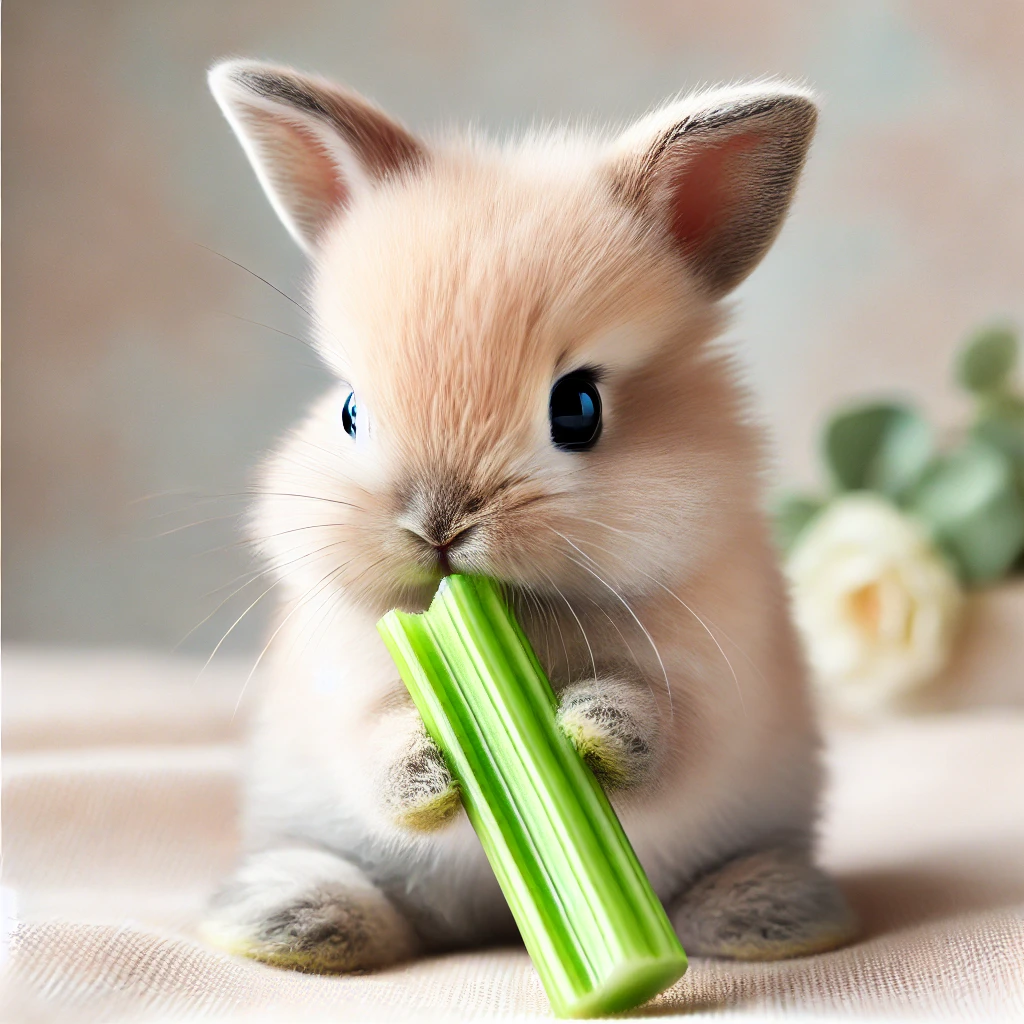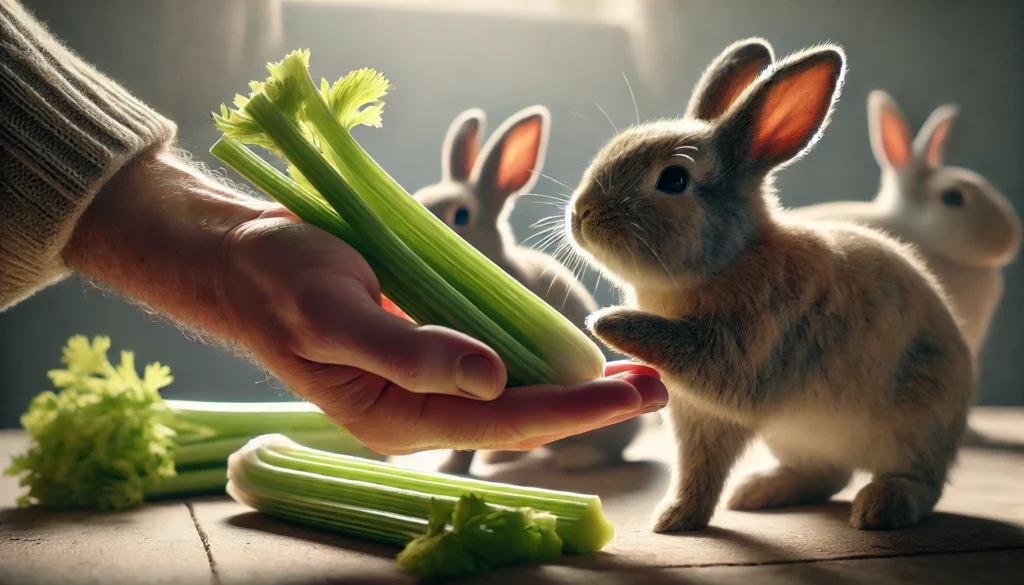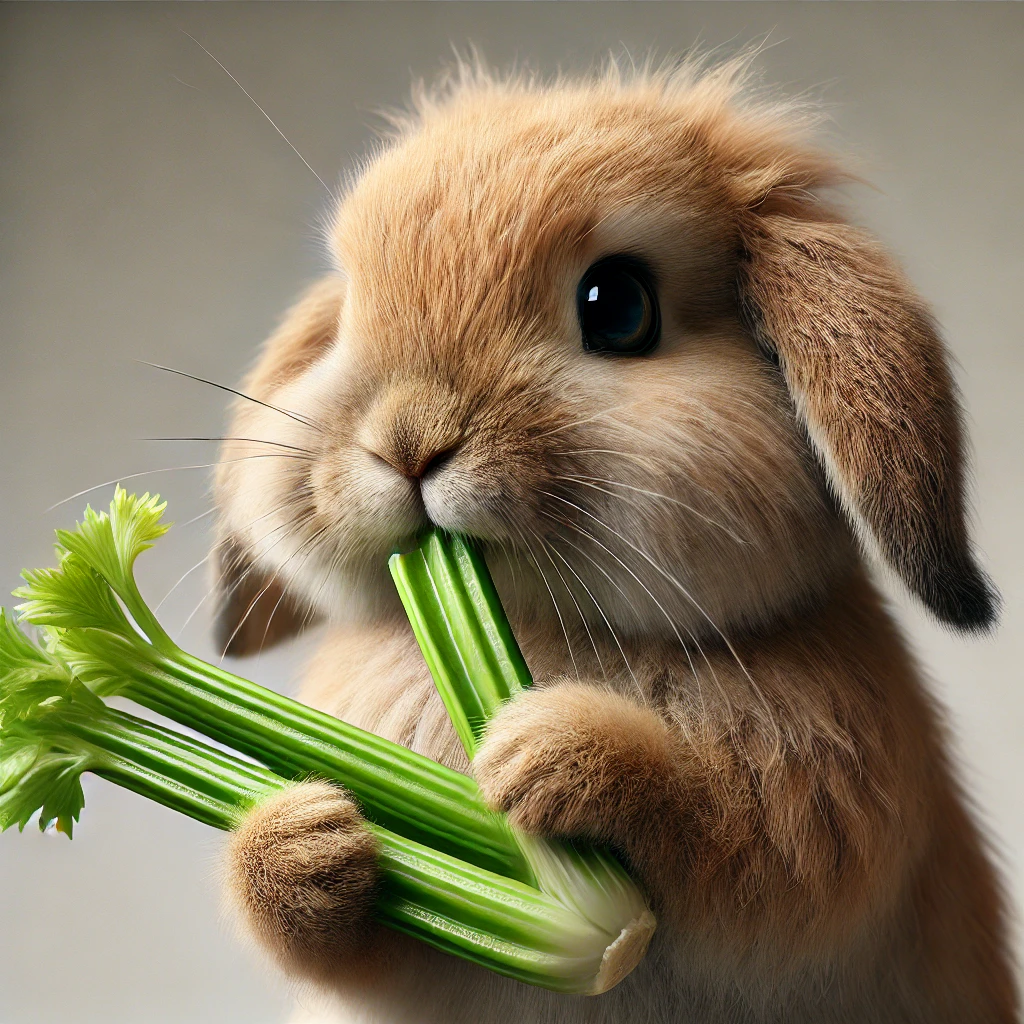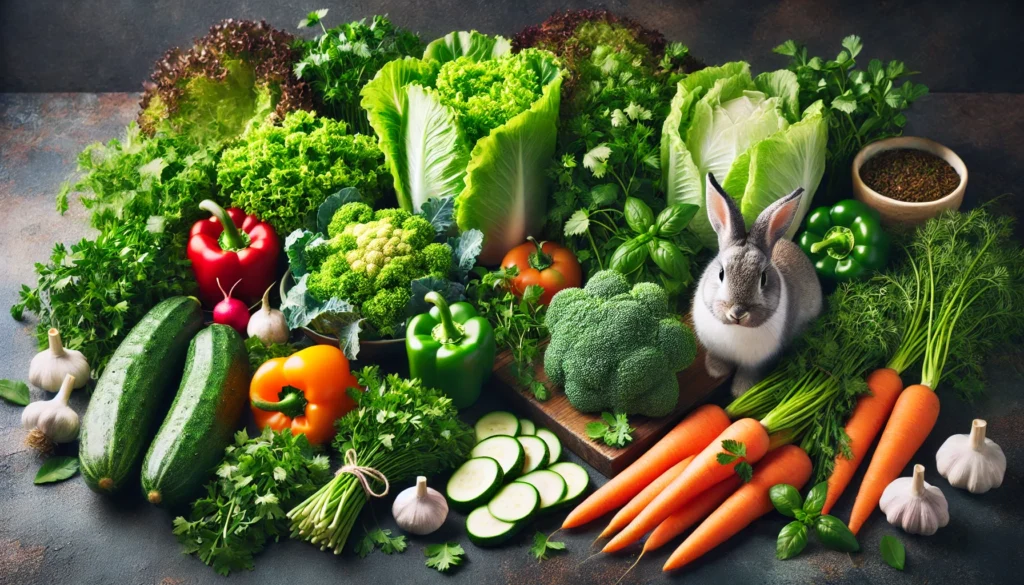Rabbits are adorable, curious creatures with specific dietary needs. As a rabbit owner, you want to ensure that your pet is eating a balanced and healthy diet. While hay, fresh vegetables, and water make up the bulk of a rabbit’s diet, not all vegetables are safe for rabbits to consume in large amounts. One common question rabbit owners ask is, “Can rabbits eat celery?”
In this article, we will dive deep into whether celery is a good addition to your rabbit’s diet, covering all aspects of celery consumption for rabbits. By the end, you’ll have a clear understanding of whether celery is safe and how much is appropriate for your furry friend.
Is Celery Good for Rabbits?
Celery is a crunchy, low-calorie vegetable that contains essential nutrients like fiber, vitamins A, C, and K, and various antioxidants. For rabbits, the fiber in celery can be particularly beneficial as it helps maintain healthy digestion, which is vital for their overall well-being.
One of the key benefits of celery is that it is hydrating, thanks to its high water content. Rabbits need to stay hydrated to keep their digestive system functioning properly, and celery can help with this, especially in warmer months.
However, while celery does offer some nutritional benefits, it is not a replacement for your rabbit’s main diet of hay, which provides the bulk of the necessary fiber. Instead, celery can be a healthy addition to their diet, provided it’s given in moderation.

Is Celery Bad for Rabbits?
Though celery is not inherently bad for rabbits, there are a few things to be cautious about. The stringy texture of celery can sometimes pose a choking hazard, particularly if the pieces are not cut small enough. It’s important to chop celery into manageable, bite-sized portions to prevent any risk of choking.
Another concern is that celery contains a significant amount of water. While staying hydrated is essential, too much watery food can lead to diarrhea or an upset stomach in rabbits. Because of this, you should never overfeed celery or any other vegetable that is high in water content.
Additionally, because celery is low in nutritional density compared to other leafy greens and veggies, it should not be the mainstay of your rabbit’s diet. Too much celery, without the proper balance of fiber from hay, can lead to digestive problems.
Can Rabbits Eat Celery Leaves?
Yes, rabbits can eat celery leaves, and they often enjoy them even more than the stalks! Celery leaves are soft, making them easier to chew and digest for rabbits. Plus, they are packed with nutrients, including antioxidants and vitamins.
Celery leaves also contain a slightly bitter taste, which some rabbits seem to like. When you feed celery to your rabbit, you can offer the leaves along with the stalks, ensuring you give them a well-rounded treat. Just like with the stalks, celery leaves should be fed in moderation to avoid any digestive upset.
Can Rabbits Eat Celery Stalks?
Yes, rabbits can eat celery stalks, but there are a few guidelines to follow. As mentioned earlier, the stringy texture of celery stalks can be a choking hazard if not prepared correctly. Always slice the stalks into small, thin pieces to reduce the risk of choking and to help with digestion.
Celery stalks can be a crunchy, refreshing treat for your rabbit, especially during warm weather. However, because of their high water content, it’s crucial to avoid giving large quantities. You want to avoid overloading your rabbit’s diet with too much water, which can cause digestive issues.

Do Rabbits Like Celery?
Many rabbits do enjoy eating celery, though preferences vary from rabbit to rabbit. Some love the crunchy texture, while others may prefer softer vegetables. If your rabbit seems to enjoy celery, you can offer it as an occasional treat, mixed in with other vegetables.
It’s important to note that while rabbits may like the taste of certain foods, not everything they enjoy is good for them in large amounts. Just because your rabbit shows enthusiasm for celery doesn’t mean it should become a regular part of their diet. So, the question remains, should rabbits eat celery?
How Much Celery Can a Rabbit Eat?
Moderation is key when feeding celery to your rabbit. A good rule of thumb is to offer celery as a small part of their overall fresh food intake, which should make up about 10-15% of their daily diet. For an adult rabbit, this might mean giving a few small slices of celery a few times a week.
Here’s a quick guide on how much celery to give your rabbit:
- For baby rabbits: Avoid feeding celery to rabbits under 12 weeks old, as their digestive systems are still developing, and they should stick to a diet of hay and mother’s milk.
- For adult rabbits: A small amount, around one-inch-long pieces, two to three times per week is usually enough. Mix it with other rabbit-safe vegetables like romaine lettuce, kale, and carrots to provide a balanced diet.
Always introduce new foods slowly to monitor your rabbit for any digestive issues. If you notice diarrhea or a decrease in appetite, stop feeding the celery and consult your veterinarian.
Other Vegetables to Feed Your Rabbit
While celery can be part of your rabbit’s diet, it’s important to offer a variety of vegetables to ensure they are getting all the nutrients they need. Here are some other rabbit-safe vegetables you can include in their meals:
- Carrots: While rabbits love carrots, they are high in sugar, so only give them as an occasional treat.
- Bell peppers: Packed with vitamins and low in calories, bell peppers are a great addition.
- Cucumbers: A refreshing and hydrating snack, but should also be given in small amounts due to its water content.
- Cabbage: Cabbage is safe but can cause gas, so it should be given in moderation.
- Broccoli: Broccoli is healthy but may cause gas; offer small portions to your rabbit.
- Lettuce: Romaine lettuce is a good choice, but avoid iceberg lettuce as it lacks nutrients.
- Kale: Kale is nutritious but should be given in moderation due to its calcium content.
- Tomatoes: Ripe tomatoes are safe, but avoid the leaves and stems which are toxic.
- Asparagus: Asparagus is safe and provides fiber, but some rabbits may not like the taste.
- Catmint: Catmint is a safe herb, but not all rabbits will enjoy its strong scent.
- Apples (without seeds): Apples make a sweet treat, but always remove the seeds as they are toxic.
- Blueberries: Blueberries are a safe, antioxidant-rich snack for rabbits in small amounts.
- Strawberries: Rabbits can enjoy strawberries occasionally as a sugary treat.
- Grapes: Grapes are safe for rabbits, but their high sugar content means they should be limited.
Always wash vegetables thoroughly before feeding them to your rabbit and remove any pesticides or dirt that may be harmful.
How To Feed Celery to Your Rabbit
Feeding celery to your rabbit is simple, but it’s important to do it correctly to ensure your pet stays safe and healthy. Follow these steps to introduce celery into your rabbit’s diet properly:
- Start Slowly: If your rabbit has never had celery before, introduce it gradually. Give them a small piece, about the size of a thumbnail, and monitor their reaction over the next 24 hours. If they show no signs of digestive discomfort, such as diarrhea or soft stools, you can continue offering celery in small portions.
- Wash Thoroughly: Always wash celery thoroughly to remove any dirt, pesticides, or chemicals that might be harmful to your rabbit. Organic celery is a good option, but it should still be washed well.
- Chop Into Small Pieces: Celery stalks have long, stringy fibers that can pose a choking hazard. To avoid this, chop the stalks into small, bite-sized pieces (about one-inch lengths). This makes it easier for your rabbit to chew and reduces the risk of digestive problems.
- Include the Leaves: Celery leaves are a great part of the plant that your rabbit can enjoy, too. They’re softer and packed with nutrients. You can offer both the stalks and leaves together to give your rabbit a variety of textures.
- Limit the Amount: Celery should only be a small part of your rabbit’s fresh vegetable intake. A couple of one-inch pieces, a few times a week, are enough to offer variety without overwhelming their digestive system. Always balance their diet with hay and other vegetables.
- Monitor Your Rabbit: After feeding celery, keep an eye on your rabbit’s behavior and droppings. If you notice any unusual signs like soft stools, diarrhea, or changes in appetite, stop feeding celery and consult a veterinarian.
Conclusion
So, can rabbits eat celery? The answer is yes but in moderation. Celery can provide hydration, vitamins, and a fun crunchy texture for rabbits, but it should never replace the main components of their diet, like hay and leafy greens.
To recap:
- Celery is safe for rabbits in small amounts, but be cautious of its stringy texture and high water content.
- Celery leaves are also safe and can be offered along with the stalks.
- Introduce celery slowly to your rabbit’s diet, and always cut it into small pieces to avoid any choking hazards.
- Limit celery to a few small slices, two to three times per week, to prevent any digestive issues.
By following these guidelines, you can safely add celery to your rabbit’s diet as an occasional treat. Always pay attention to your rabbit’s health and consult a vet if you notice any adverse reactions.
FAQs
- Do rabbits eat raw celery?
Yes, rabbits can eat raw celery, but it should be cut into small pieces to avoid choking hazards and digestive issues. - What vegetables rabbits cannot eat?
Rabbits should avoid vegetables like potatoes, onions, garlic, and rhubarb, as they can be harmful or toxic to them. - Can rabbits eat celery or cucumbers?
Yes, rabbits can eat both celery and cucumbers in moderation, but they should not replace their main diet of hay and leafy greens. - Can rabbits eat spinach and celery?
Yes, rabbits can eat both spinach and celery, but spinach should be given in limited amounts due to its high oxalate content. - What is a rabbit’s favorite food?
A rabbit’s favorite food is typically fresh hay, which should make up the majority of their diet for optimal digestive health.



Leave a Reply